深圳牛津英语2015年秋季 7上 unit2 语法
(牛津版深圳版)英语七年级上册词汇详解+练习(含答案)

1. grammar n.语法【衍生】阅读reading听力listening口语speaking/spoken English写作writing【考察项目】常规阅读和完形填空英语学习类文章出现【经典例句】①[牛津高阶字典]I find German grammar very difficult.我发现德语语法很难学。
②[牛津高阶字典]His pronunciation is good,but his grammar is terrible.他的发音不错,但他的语法极差。
2.sound n.声音v.听起来【衍生】感官动词总结:feel感觉look看起来smell闻起来taste尝起来listen to=sound【考察项目】辨析词:sound自然声音voice:人声noise:噪音感官动词+adj.sound+adj.【经典例句】①[课文原句]Learn to say the/i:/,/i/,/e/,/p/and/b/sounds.------学习去读/i:/,/i/,/e/,/p/和/b/这些音。
②[2015年沈阳]It sounds similar.这听起来很相似。
plete v.完成adj.完全的,完整的【衍生】pletely完全地complete=finish完成【经典例句】①[课文原句]Complete an email to a new friend.完成一个给新朋友的电子邮件。
②[牛津高阶字典]You can't leave until you complete the work.你们完成工作后才可以离开。
4.hobby n.爱好(hobbies)【衍生】对比:habit习惯学科:subject运动:sport【考察项目】写作题目:Having a good hobby is./My favourite hobby is.【经典例句】①[课文原句]Friends often write to each other about their hobbies.朋友们经常就他们的爱好写信给对方。
深圳牛津版初中英语七年级英语上册Unit2词汇与语法
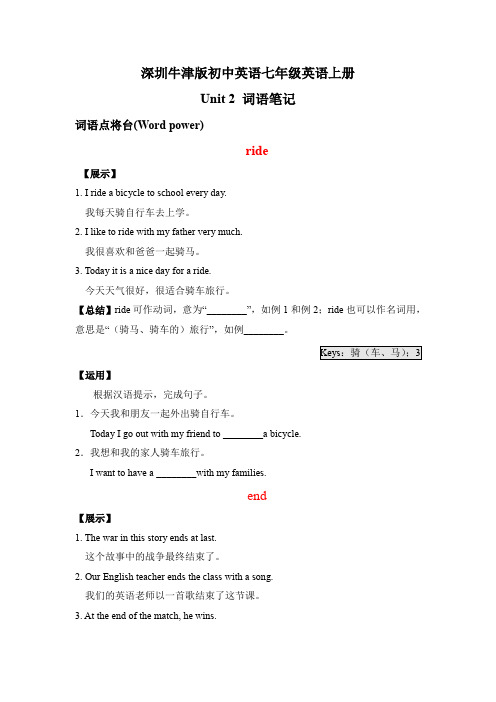
深圳牛津版初中英语七年级英语上册Unit 2 词语笔记词语点将台(Word power)ride【展示】1. I ride a bicycle to school every day.我每天骑自行车去上学。
2. I like to ride with my father very much.我很喜欢和爸爸一起骑马。
3. Today it is a nice day for a ride.今天天气很好,很适合骑车旅行。
【总结】ride可作动词,意为“________”,如例1和例2;ride也可以作名词用,意思是“(骑马、骑车的)旅行”,如例________。
Keys:骑(车、马);3 【运用】根据汉语提示,完成句子。
1.今天我和朋友一起外出骑自行车。
Today I go out with my friend to ________a bicycle.2.我想和我的家人骑车旅行。
I want to have a ________with my families.end【展示】1. The war in this story ends at last.这个故事中的战争最终结束了。
2. Our English teacher ends the class with a song.我们的英语老师以一首歌结束了这节课。
3. At the end of the match, he wins.比赛的最后,他赢了。
【总结】end作动词,意为“________”,如例1; end…with…意为“以………结束……”,如例2;end也可以作为名词用,意为“结束”,构成短语________ “在……的结尾”,如例3。
Keys:结束;at the end of 【运用】根据汉语提示,完成句子。
3.他的故事结束了。
His story ________.4.童话爱情故事的最后,王子和公主在一起了。
________the fairy-tale love story, the prince and the princess get together.practice【展示】1. We need more practice in playing the piano.我们需要多练习一下弹钢琴。
Unit2知识点整理牛津译林版七年级英语上册

7A Unit 2 知识点整理1.many times a day 一天许多次once一次/twice两次/...times ......次Eddie walks to his bowl three times a day.(对画线部分提问)How often does Eddie walk to his bowl?Eddie walks to his bowl three times a day.(对画线部分提问)How many times does Eddie walk to his bowl a day.2.walk to my bowl 走向我的碗walk home 步行回家(此处home副词,前面不加to)4.What/ How about doing sth. 做......怎么样?What/How about going swimming? 去游泳怎么样?5.What’s your favourite sport?你最喜欢的运动是什么?6.my favourite football player我最喜爱的足球运动员sb’s favourite football player(sb’s:my/your/his/her/our/their)play(v.)player(n.)类似的变化:teachteacher swimswimmer writewriter singsinger7.be a member of ...=be in... ...的一名成员He is a member of Huanghe Football Club.=He is in Huanghe Football Club.8.look happy(adj.) 看起来高兴(look是感官动词,后接形容词) look/taste尝起来/smell闻起来/sound听起来/feel摸起来+形容词look at sb. happily(adv.) 高兴地看着某人(look实义动词,用副词修饰)My parents look happy and they look at me happily.9.play football very well足球踢得非常好(very well副词修饰动词play)10.What does he look like?=How does he look?He looks slim.他看起来怎么样?(提问外貌)他看起来苗条。
牛津英语七年级上7AUnit2知识点归纳

Page 221 Is it time for breakfast7是吃早饭的时间了吗?▲陈述句为:It's time for breakfast.句型it's time for的意思还可以用it’s time to do …来表。
如:(a)It's time for playing football.是踢球的时间了。
此句可以转化为:It's time to play football.(b)It's time for English class.是上英语课的时间了此句可以转化为:It's time to have English class.2 Some dogs just don't know how to have fun.一些狗就是不懂得怎么玩。
▲have fun的意思是“嬉戏”,“娱乐”,fun为不可数名词。
fun有时也可以作形容词,意思是“有趣的,令人愉快的”。
如:(a)Swimming in the sea is great fun!在海里游泳是件很有趣的事。
(b)The game sounds fun.这个游戏听上去很有趣。
、△米莉有个名叫汤米的新网友,她正在告诉他有关她新学校的事情。
△向你的网友讲讲你的学校生活,然后完成网友俱乐部网站的快乐图表。
Page 23A下面是米莉的一篇日记。
你也想写篇日记。
将你的日常活动填人下面日记的各项内Do morning exercises做早操▲do exercise意思是“做运动”,也可说take exercise。
如:Do at least 30 minutes exercise every day.每天最少做30分钟运动。
Page 24A米莉写了封邮件给她的新网友汤米。
下面是她写的电子邮件。
1 Amy is my best friend.埃米是我最好的朋友。
▲best是形容词good的最高级。
2015-2016深圳牛津七年级英语上册第二单元知识点及语法学案

2015-2016,深圳,牛津,七年级,英语,上册,第二,【,【2015-2016】深圳牛津七年级英语上册第二单元知识点及语法学案Unit Two Daily life Readingfamily 的意思是“家庭、家庭成员”,与居住的房子无关。
当family作为整体概念的“家庭”讲时是单数;当“家庭成员”讲时是复数; house 指“家”时含义较窄,仅指“房屋”这一建筑物,一般指独门独户的房子,不指楼房; home 指“家、住所”,指一个人(或一家人)居住的地方,也可指一个人出生或长大的地方(乡村、城市或国家等)。
它具有house所没有的感情色彩exercise是练习,一般用语,可指训练,锻炼,操练等.如spelling exercise(拼写练习), ,lack of exercise缺乏练习,do one's exercise做练习, physical exercise体育锻炼exercise的用法:1.作可数名词用,“练习,习题,体操,功课,操练”等,常用复数。
I'm doing my exercises.我在做练习/功课。
Doing morning exercises is helpful to our health.做早操对我们的健康是有益的。
You should do more spelling exercises. 你应该做更多的拼写练习。
2.作不可数名词用,“锻炼,运动”。
You are weak because of the lack of exercise.你身体弱是因为缺少锻炼。
Take more exercise,and you will be healthy.多多锻炼,你会健康的。
3.作动词用,“训练,锻炼”。
You must exercise yourself in order to be stronger and healthier.为了更健康更强壮,你必须锻炼自己。
Unit2Vocabulary词汇课件牛津深圳版英语七年级上册

just
恰好
Thank you !
6、go to bed 去睡觉(fall asleep 睡着) 7、get up 起床(wake up 叫醒) 8、on foot 步行 9、be full of energy充满活力(=be filled with ….) 10、get... ready for 准备好 11、put on 举办,上演,穿上 12、clean up 打扫干净(tidy up整理) 13、pick up 取,摘,接sb.
4、develop v. 发展
developed adj. 发达的 developing adj. 发展中的 development n. 发展 developed country 发达国家 developing country发展中国家
5、skill n. 技能
skilled/ skillful adj. 熟练的
6、teen adj. 青少年的
数字+teen:fifteen, sixteen teenager n. 青少年(13-19)
7、greeting n. 问候
greet v. 问候
8、energy n. 精力
energetic adj. 精力充沛的 powerful adj.
9、luckily adj. 幸运地
新G7U2 School Life
Words and phrases
1、activity n. 活动
active adj. 积极的
2、practise v. 练习
practice n. 练习 practise doing sth.练习做某事
3、solve v. 解决
solution n. 解决办法
mood 情绪,心情
牛津七上Unit2知识点
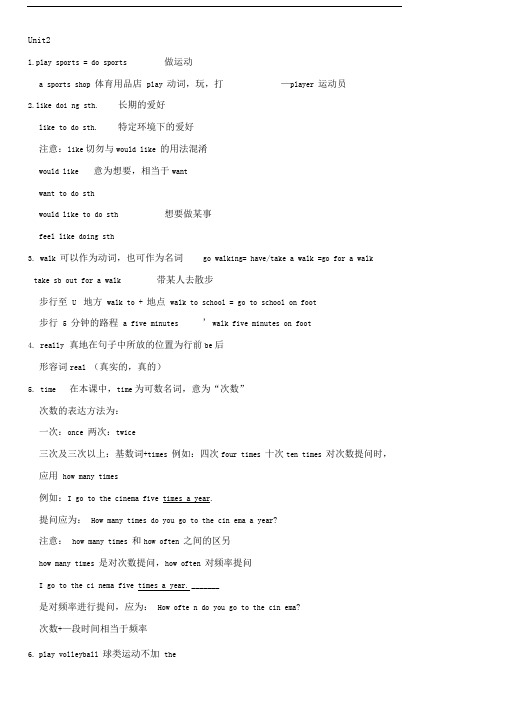
Unit2l.play sports = do sports 做运动a sports shop 体育用品店play 动词,玩,打—player 运动员2.like doi ng sth. 长期的爱好like to do sth. 特定环境下的爱好注意:like切勿与would like 的用法混淆would like 意为想要,相当于wantwant to do sthwould like to do sth 想要做某事feel like doing sth3.walk 可以作为动词,也可作为名词go walking= have/take a walk =go for a walk take sb out for a walk 带某人去散步步行至U 地方walk to + 地点walk to school = go to school on foot步行 5 分钟的路程 a five minutes ' walk five minutes on foot4.really 真地在句子中所放的位置为行前be后形容词real (真实的,真的)5.time 在本课中,time为可数名词,意为“次数”次数的表达方法为:一次:once 两次:twice三次及三次以上:基数词+times 例如:四次four times 十次ten times 对次数提问时,应用how many times例如:I go to the cinema five times a year.提问应为:How many times do you go to the cin ema a year?注意:how many times 和how often 之间的区另how many times 是对次数提问,how often 对频率提问I go to the ci nema five times a year. _______是对频率进行提问,应为:How ofte n do you go to the cin ema?次数+—段时间相当于频率6.play volleyball 球类运动不加thePlay the piano 乐器之前加the7.enjoyenjoy sth.enjoy doing sth 喜欢做某事例女口: I enjoy readi ng.enjoy on eself =have a good time= have fun (in )doing sth = It's fun to do sth例如:He enjoys himself playing basketball.=He has a good time play ing basketball.=He has fun play ing basketball.8.favourite = like sth best 最喜欢Wha' s your favourite sport? (前面用物主代词或名词所有格)=Which/What sport do you like best?9.What about= how aboutwhat about/ how about doing sth./ sth.(1)询问情况I am a stude nt. what about/ How about you? 我是一个学生,你呢?(2)用来表达征求意见和提出建议what about/ How about going fishi ng tomorrow?Why not do sth ?/ Shall we do sth ?/ Let ' s do sth ?10.be a member of= be in …club/team= play for club/teamHe is a member of our school football team.=He is in our school football team.look/ feel/ sou nd/taste/smell 为感官动词,后面需要加形容词The sofa feels soft.11.对某人的外貌提问的方法:How does he look?What does he look like?12.free 自由的:be free to do sth 反义词:busy be busy with / doing sth免费的:Shopping bags are not free now.13.English Club /sports club / dancing club take part in a club =join in a club14.make sb (宾)使某人.......(1)make +宾语+宾补make me stro ng(2)make sb do sth 使某人做... 事Swimmi ng makes her look stro ng.(3)make sb. Sth.=make sth. for sb.15.hopehope的用法非常重要,常考易错hope to do sthI hope to go on a pic nic with you.hope+句子注意:没有hope sb. to do sth. 这种用法,切记切记!!I hope I can help you with your En glish.如果在考试的时候看到hope后面紧跟的是sb,那么一定是hope后加的句子16.real和true的区别:real指事物本身的真假,ture指故事、消息、信息本身的真实性,不是虚构的e true 变成现实come from 来自come back 回来18.at weekends = on weekends =at the weekend =on the weekend\19.Many of my students...many of + the/one ' s + 名词They all = All of them20.else常用于特殊疑问词或不定代词后What else = what other thi ng somethi ng else21.Reading is fun. 动名词作主语,谓语动词用单数22.talk about sth with sb 和某人谈论关于某物23.hero, potato,tomato 、mango 变复数+es24.There be的一般将来时There will be / There is going to be / There are going to be25. 名词所有格:Tom's and Jack ' s bedroom 分别拥有Tom and Jack ' s bedroom 共同拥有26. shop = do some shopping fish = do some fishing read = do some reading。
牛津深圳版七年级上册unit2语法知识复习

一般现在时 1.基本用法
3.按时间表(timetable)将要发生的动作 (课表、航班表、车程表等)
3.The train starts at 2 o’clock.(火车两点开) go, come, leave, start, move 表将来
— Mom, I want to go camping with my classmates.
— Ok, sweet, havห้องสมุดไป่ตู้ a good time.
Production
根据汉语提示完成句子。
1. 这是一篇关于我们学校生活的文章。
This is _a_n_a_r_ti_c_le_ _ab_o_u_t_ our school life.
2. 数学老师很和蔼,他很少生气。
The Maths teacher is very kind and he _se_l_d_o_m_ gets angry.
3. 约翰喜欢参加学校组织的活动。
John enjoys t_a_k_in_g_ __p_a_rt_ ___in_ the school activities.
4. He_w__a_s_h_e_s(wash) clothes with his hands. 5. Simon _p_a_s_s_e_s(pass) the ball to Daniel.
6. Miss Li_t_e_a_c_h_e_s(teach) Chinese. 7. Look at the animal, it _h_a_s_ four legs.
sports meeting and won prizes.
Unit2知识点 牛津译林版英语七年级上册

7AU2知识点New words and expressions:1.walking/swimming/singing /dancing is my hobby.2.Really? /He’s really a paper tiger.3.a bowl of milk4.three times/once a year/twice a weekHow many time—once/three times.How often do you go home? Once a week.5.play tennis/basketball/volleyball/table tennis6.enjoy the school life/working in Beijing/living in Shanghai/myself(玩的开心)7.go swimming/fishing/shopping/walking/running8.eleven football players9.He’s in the football team=He’s a member of the football team10.in the Computer /Reading Club11.He’s free/He’s very busy12.I hope+ (I hope everyone swims very well)I hope to do sth (I hope to go to Beijing by plane.)13.Your dream comes true.14.He’s good at drawing—He draws well15.at weekends—at the weekend (Saturday and Sunday)16.Can I borrow your books? Of course.Here you are17.else What/whatwhere else can you see..?Is there anything else in today’s newspaper?Other+ other books18.a lot of/lots of =many or muchI have a lot of books to read.There’s lots of milk in the glass.19.have fun(in doing sth)/have a good timeHe has fun (in)playing games.20.talk about /of talk to /with me talk about the filmHe’s talking to us about the story21.a few basketball matches22.The twins are our heroesLanguage points:1.Do you have any books ?I don’t have any books2.I walk to school=I go to school on foot.He takes a bus to work=He goes to work by bus.Kate rides a bike to school=Kate goes to school by bike.3.many times a day/five times a week4.What’s your favourite sport? I like playing volleyball5.He often play basketball after school.6.I’m 12 years old.What about him/her/them?7.every week/day/year/Monday this week/evening8.my favourite football star9.She’s in the football club=She’s a member of the football club.10.He works in Beijing.He studies at No1 Middle School.11.He looks strong/ He feels happy/ Music sounds beautiful.12.in his free time,she studies English.13.He also enjoys listening to music=He enjoys listening to music ,too.14.It makes him strong. Listening to music makes her happy.15.He wants to play tennis with me in the next World Cup16.This is our English teacher. Who is this ?That’s Jim’s book. Whose book is that?He’s a teacher What’s he? What does he do?17.He plays tennis at school.What does he do at school?Where does he play tennis?18.He gets up at six. He doesn’t get up at six.Does he get up at six? What time does he get up?19.They do housework at home.They don’t do housework at home. Do they do housework at home? Where do they do housework?20.likes/plays, study—studies fly-flies watches/washes/dresses/goes/does21. ___Jim__ (get) up early? No,______.22.___the twins___(play) football? Yes,____.23.They___(not,read) English at home.He___(not,watch) TV at school.24.When______Sam______(go) to bed? He___(go) to bed at six.25.some of the students/many of the studentsSome of us, all of us26.He doesn’t like sports very much.27.What do you do after school?28.What else does he do?Who else can you see?29.Sometimes I listen to music.30.It makes me feel great.31.He plays volleyball with us/her/them32.read a lot of interesting books /newspapers33.Reading English is fun/interesting.My brother likes basketball very much/best.35.I often play volleyball with my friends after school.。
牛津译林版七年级(上)英语重点短语、句型-Unit2(含默写格式)
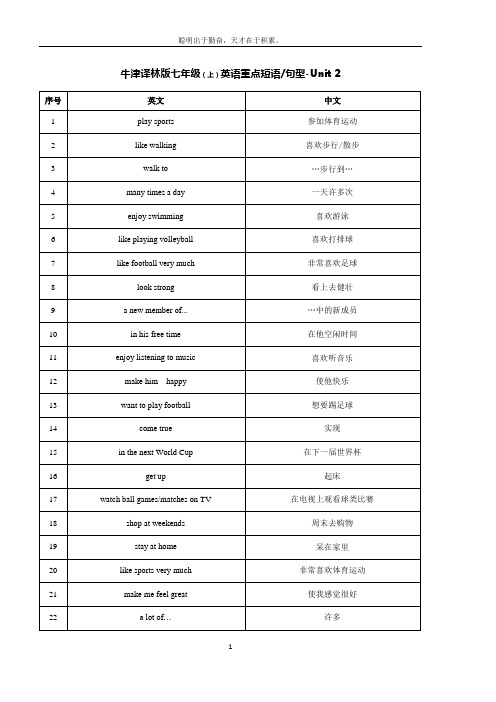
21
make me feel great
使我感觉很好
22
a lot of…
许多
序号
英文
中文
23
play basketball/volleyball/tennis
打篮球/排球/网球
24
watch basketball matches on TV
在电视上观看篮球比赛
25
my favourite basketball player
24
watch basketball matches on TV
25
my favourite basketball player
26
I walk to my bowl many times a day.
27
I go swimming every week.What about you?
28
In his free time,he also enjoys listening to music.
25
我最喜爱的篮球运动员
26
我每天都往我的饭盆那儿走好多次。
27
我每周去游泳,你呢?
28
在空闲时间里,他也喜欢听音乐。
29
我希望他实现梦想。
30
李华参加任何俱乐部吗?
31
你还喜欢做别的什么事吗?
32
看书很有趣。
33
我是我校篮球队的队员。
34
我们经常谈论篮球,并经常在电视上观看篮球比赛。
35
你经常和谁打球/玩?
牛津译林版七年级(上)英语重点短语/句型-Unit 2
序号
英文
中文
1
play sports
【2015-2016】深圳牛津七年级英语上册第二单元知识点及语法学案

【2015-2016】深圳牛津七年级英语上册第二单元知识点及语法学案Unit Two Daily life Reading1. Look at these pictures and answer the questions about your daily life.look at= have a look at 看一看; answer the questions= reply to the questions(reply to 更强调书面回答,较正式); daily life:日常生活2. Which of these things do you do once or twice a week?助动词do/does/did后面要跟动词原形;once a week, twice a week, three(four/ five…)times a week3. brush one’s teeth刷牙; watch television= watch TV看电视; play table tennis打乒乓球;ride a bicycly骑单车; play the piano弹钢琴; wash my clothes= do some washing洗衣服拓展:wash one’s face; comb one’s hair; pack one’s bag; do some cooking; go shopping= do some shopping; play computer games4. Look at the title of the article on page 17. Then circle the correct answer.the title of…: ……的标题;on page 17:在17页在具体体一天用on; 在具体几点钟用at; 在一段时间(如上/下午、星期、月份、季节、年),则用in on Monday; at 4 o’clock; in the morning; in summer;circle:圈出,划出;the correct answer:正确的答案5. How does Sam go to shool?特殊疑问句:特殊疑问词+ 一般疑问句6. a day at school 学校的一天; by Sam: 由Sam写的at school 在上学at the school在学校(可能是老师或家长)in hospital: 生病住院in the hospital: 在医院(可能是护士或家属)in bed: 卧病在床;躺在床上in the bed: 在床上(被窝里);on the bed: 在床上(如枕头)7. I am a junior high school student. I love going to school.junior high school 初中senior high school 高中primary school 小学love doing sth.= live doing sth. = enjoy doing sth.喜欢做某事practice doing sth.练习做某事finish doing sth. 做完某事go to school 去上学8. My school is close to my home, so I always go to school on foot.be close to 离……近= near =beside= not far away fromfamily 的意思是“家庭、家庭成员”,与居住的房子无关。
Unit2讲义牛津深圳版英语七年级上册

七年级英语上册unit 2二.经典句型:1.我的学校离我家很近,所以我总是步行去上学。
My school is ______ _______ my school, so I always go to school ______ _______.2.我喜欢了解世界上不同的地方I enjoy__________ _______different places in the world3.当铃响时,我和我最好的朋友Tom和Jack跑到操场.When the bell _______, I_____ to the playground with my best friends, Tom and Jack 4.午餐从上午11:50到下午12:30Lunch is ______ _____ 12:30 p.m.5.然后汤姆杰克和我参加了学校的乐队排练.Then Tom, Jack and I ______ _______ ______ the school band practice.6.晚上8点~9点之间,________ 8_______ 9 in the evening7.他总是在早上7:25到学校She always _______ ______school at 7:25 in the morning8.学校的午餐时间多长._______ ________is the school lunch time9.休息时间多短啊! _______ ________ it is!My name is Sam. Now I am a student(1)__________a junior high school.I love to go to school.(2)__________my home is close to my school, I always walk to school. My first lesson starts at 8 a.m. I am seldom late (3)_____school. In all subjects, I like Geography (4)________(well).I enjoy (5)_____________(learn)about as many places as possible in the world.In the morning, our lessons are usually Chinese, Maths and English. There (6)_______(be) a morning break at 9:50 a.m. As soon as the bell rings, I run to the playground withmy(7)___________(classmate). We often play games. The morning break (8)_________(end)twenty minutes later. How short time it is!I have lunch from 11:50 am to 12:30 pm.(9)_____________(we) classes end at threethirty.After school,my friend, Tom and Jack, and I take part in the school band practice. We play music together. I enjoy (10)_______________(my) at school.四.常考知识点:1. between一般指“两者”之间,常用短语:between…and.among一般指“三者或三者以上”之间练习1)The bank is __________the hospital and hotel.2)There is a map ________ two windows.3) The boy is playing ________his friends We have a good teacher. (改为感叹句) 分析:感叹句=感叹词+陈述部分! 步骤: 1.断。
深圳牛津版英语七年级上重点词汇语法

Unit 1 Making friends1. Key wordsGerman hobby Germany world blog country mountain Japan grammar age elder flat sound dream friendly yourself complete US engineer everyone2. Key phrasesclose to live with go to school far away from... (be) good at do well in pay attention to sb./sth.make friends with all over get sth. from sb.’d like to do sth.=would like to do sth. let sb. do sth.ask sb. about sth. help sb.(to) do sth. tell sb. about sth. use sth. to do sth. best wishes write to sb. about sth,in one’s free time (be) friendly to sb.hear from sb./receive a letter from sb./get a letter from sb.3. Key language points1.) be from=come from2.)close to=next to, near3.)(be) good at=do well in4.)(be) friendly to sb。
5.) want to do sth.6.) make friends with7.) all over 遍及8.)’d like to do sth=would like to do sth.would like sth. would like sb. to do sth.4.Key grammarA.特殊疑问句1.疑问词what where who how how old when why which whose what time(问时刻) how long how far how soon 多快how often how many how much2.特殊疑问句构成:特殊疑问词+一般疑问句B.不定冠词a/anUnit 2 Daily life1.Key wordsdaily bell article ring never end table tennis band ride practice usually together so market seldom guitar Geography grade break start2.Key phrasesjunior high school on foot take part in have a good time go to bed get up talk about between A and B (be) late for school brush one’s teeth ride a bicycle make notes add sth. to sth. at the end of take turns to do sth. arrive at/inhelp sb. with sth. Keep a diary remember to do sth. enjoy/love doing sth.3.Key language points1.) enjoy(doing) sth.2.) love doing sth.3.) ride (rode ridden)4.) end v. /n.5.) practice n. practise v. practise doing sth.6.) (be) late for7.) on foot8.) go to bed去睡觉go to sleep睡着了4. Key grammarA.一般现在时1. 当谓语动词为实义动词时:肯定句、否定句、疑问句、回答2. 当谓语动词为be动词时:肯定句、否定句、疑问句、回答B. 频度副词和副词短语的使用1、频度副词使用时一般放在动词前always usually often sometimes seldom never2、频度副词短语使用时一般放在句末every day once a week twice a week all the timefive times a year at the weekend every day/night/year/month... 一、一般现在时:【No. 1】一般现在时的功能1.表示事物或人物的特征、状态。
牛津译林版七年级英语上册Unit-2 grammar语法课时教案
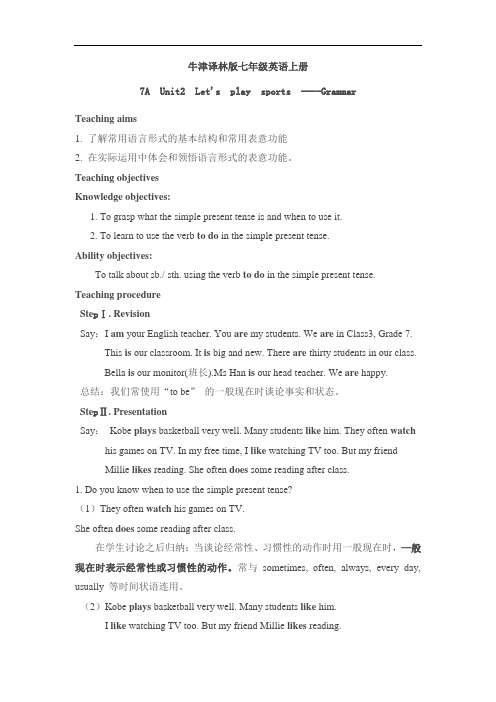
牛津译林版七年级英语上册7A Unit2 Let's play sports ----GrammarTeaching aims1.了解常用语言形式的基本结构和常用表意功能2.在实际运用中体会和领悟语言形式的表意功能。
Teaching objectivesKnowledge objectives:1. To grasp what the simple present tense is and when to use it.2. To learn to use the verb to do in the simple present tense.Ability objectives:To talk about sb./ sth. using the verb to do in the simple present tense. Teaching procedureSte pⅠ. RevisionSay:I am your English teacher. You are my students. We are in Class3, Grade 7.This is our classroom. It is big and new. There are thirty students in our class.Bella is our monitor(班长).Ms Han is our head teacher. We are happy.总结:我们常使用“to be”的一般现在时谈论事实和状态。
Ste pⅡ. PresentationSay:Kobe plays basketball very well. Many students like him. They often watch his games on TV. In my free time, I like watching TV too. But my friendMillie likes reading. She often does some reading after class.1. Do you know when to use the simple present tense?(1)They often watch his games on TV.She often does some reading after class.在学生讨论之后归纳:当谈论经常性、习惯性的动作时用一般现在时,一般现在时表示经常性或习惯性的动作。
牛津深圳七上M1Mylife U2Dailylife第3课时语法课件
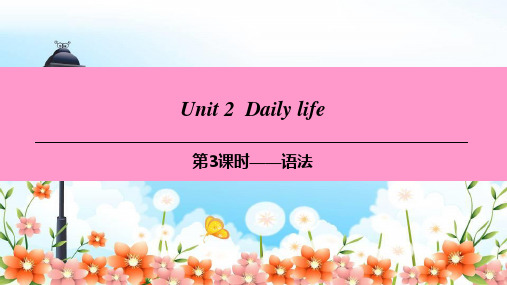
2.拓展用法 (1)表示现在的状态。如: My father is at work. He is very busy. 我的父亲在工作,他很忙。 The boy is twelve. 这个男孩十二岁。 (2)表示主语具备的性格、特征和能力等。如:My sister is very clever. 我的妹妹 非常聪明。 I like singing, but I can’t sing very well. 我喜欢唱歌,但我唱得不是很好听。 (3)表示客观真理,客观存在,自然现象。如:The earth moves around the sun. 地 球围绕太阳转。 Shanghai lies in the east of China. 上海位于中国的东部。
(4)表示按计划或安排好的,或将要发生的动作,可用一般现在时表将来。 但只限于 start,begin,leave,go,come,arrive,return 等。如: The train leaves at six tomorrow morning. 火车明天早晨六点开。
(5)在时间、条件状语从句中,用一般现在时表示将来时的动作。如: If it doesn’t rain tomorrow, we’ll go to the park. 如果明天不下雨,我们就去公 园。
课时过关
一、按要求改写句子。
1.It is sunny today. 否定句: It isn’t sunny today.
一般疑问句: 肯定/否定回答:
Is it sunny today? Yes, it is.; /No, it isn’t.
2.All the students like singing. 否定句: All the students don’t like singing. 一般疑问句: Do all the students like singing? 肯定/否定回答: Yes, they do.; /No; they don’t.
Unit2 Grammar 牛津深圳版英语七年级上册

• ???经常在上课时睡觉吗?(sleep) • ???总是准时交作业吗?(hand in, on time) • ???通常很早到学校吗?(get to school very early) • ???经常打电脑游戏吗?(play computer games) • ???和???经常在操场打篮球吗?(play basketball) • ???和???经常放学后在课室玩吗?(play)
• 在一般疑问句中,要用助动词 do 提问,如主语为第三人 称单数,则用 does,同时还要还原实义动词。
• Do we often have a lot of homework to do? • Yes, we do. We often have a lot of homework to do. • No, we don’t. We don’t often have a lot of homework to do.
有规律的动作
I get up at 6 o’clock every day and get home at 6:00 p.m.
• We have six English classes every week. • Many students often speak Cantonese(广州话)after class. • Zhu Ying and Guo Ping always listen to the teachers carefully in class. • Zhu Jiaxuan and He Zibin often stand up to answer the teacher’s
question in class. • Chen Wenxuan and Fang Junhao often sit at the back of the classroom
牛津英语七年级上册Unit2知识梳理

牛津英语7A Unit2知识梳理一、同步知识梳理知识点1:let型祈使句(P18)(1)Let's celebrate!这是由let引导的祈使句,祈使句是英语的基本句型之一,这个句式常用来表示说话人的建议、请求、命令等。
它的句型是“let+人称代词宾格+动词原形”,即“let+sb+do+sth”。
eg: Let's go and see our English teacher.Let me help you find it.注:let's和let us略有不同,“let's+动词原形”结构表示祈使对象包括说话人和听话人双方在内,而“let us+动词原形”结构表示请求对方允许自己(第一人称复数)做某事时,这里的us 不包含听话人在内,不能缩写。
(2)let型祈使句的否定形式分两种:①含第三人称主语的祈使句的否定形式在句首加don't。
②含第一人称主语的祈使句的否定式不再句首加don't,而是用“let +sb+not+do”eg: Don't let him in.Let's not laugh at her.知识点2:Eddie, do you like any sports? 艾迪,你喜欢运动吗?(P18)(1) like vt. 反义词是dis like 不喜欢(2) sport此处为可数名词,意为“体育运动”eg:Tennis is a popular sport. 网球是一项很流行的运动。
知识点3:Yes, I like walking. 是的,我喜欢散步。
(P18)walking 名词,“散步,行走”(动词+ing 变成名词,也叫动名词),动词形式为walk, 意为“走,步行”eg:Walking in the morning is good for people.知识点4:really adv. (副词) 实际上,事实上;My father didn't really love her. 我爸爸实际上并不爱她。
牛津深圳版七年级上册unit2语法知识复习

— Ok, sweet, have a good time.
Production
根据汉语提示完成句子。
1. 这是一篇关于我们学校生活的文章。
This is _a_n_a_r_ti_c_le_ _ab_o_u_t_ our school life.
选词填空:
1) My father __jo_i_n_e_d_ the army in 1970.
2) He told me that he had an important meeting to _a_t_te_n_d___. 3) Last week some of my classmates_t_o_o_k_p_a_r_t _in_ the school
always 频度副词“总是,一直” ,通 常与一般 现在时连用。常用的频度副词有:
3. I enjoy learning about different places in the world.
句意:我喜欢了解世界上各个不同的地方。 enjoy 动词“享受,喜欢”,后跟动名词或名词。
enjoy oneself enjoy doing sth.
2. 数学老师很和蔼,他很少生气。
The Maths teacher is very kind and he _se_l_d_o_m_ gets angry.
3. 约翰喜欢参加学校组织的活动。
John enjoys t_a_k_in_g_ __p_a_rt_ ___in_ the school activities.
4.She always arrives at school at 7:25 a.m.
广深牛津版七年级上册Unit 2 语法梳理

语法梳理
一般现在时
概念:表示现在经常反复发生的动作、存在的状态或习惯性的动作的时态。
观察下列句子,总结一般现在时肯定句的用法及结构。
1. He is twelve.
2. The workers are at work.
3. I get up at 6:30 every day.
4. He reads English every morning.
5. She likes noodles.
6. They speak French.
7. Two and four is six.
8. The moon goes around the earth.
【梳理】
用法:
1.表示现在的状态,如例1例2。
2. 表经常或习惯性的动作,如例3例4。
3. 表主语具备的性格和能力等,如例5例6。
4. 表示不受时间限制的普遍真理和自然规律,如例7例8。
结构:
1.系动词be的一般现在时:主语+ be + 其他,主语是单数时,用is,主语是复数时,用are,主语是I,用am。
- 1、下载文档前请自行甄别文档内容的完整性,平台不提供额外的编辑、内容补充、找答案等附加服务。
- 2、"仅部分预览"的文档,不可在线预览部分如存在完整性等问题,可反馈申请退款(可完整预览的文档不适用该条件!)。
- 3、如文档侵犯您的权益,请联系客服反馈,我们会尽快为您处理(人工客服工作时间:9:00-18:30)。
竞争力1对1 英语学科教案学生年级上课地点后海校区授课时间学科老师学顾老师教学课题教学目标教学重、难点教学内容Step 1 作业检查作业完成情况:优□ 良□ 中□ 差□Step 2 复习回顾前一次教案知识点Step 3 本次教案内容一般现在时的构成1. be动词:主语+be(am,is,are)+其它。
如:I am a boy.我是一个男孩。
2.行为动词:主语+行为动词(+其它)。
如:We study English.我们学习英语。
当主语为第三人称单数(he, she,it)时,谓语动词要用第三人称单数,即要在动词后加"-s"或"-es"。
如:Mary likes Chinese.四、一般现在时的变化1. be动词的变化。
①否定句:主语+ be + not +其它。
如:He is not a worker.他不是工人。
②一般疑问句:Be +主语+其它。
如:-Are you a student? -Yes. I am. / No, I'mnot.③特殊疑问句:疑问词+一般疑问句。
如:Where is my bike?2.行为动词的变化。
①否定句:主语+ don't( doesn't ) +动词原形(+其它)。
如:I don't like bread.当主语为第三人称单数时,要用doesn't构成否定句。
如:He doesn't often play.②一般疑问句:Do( Does ) +主语+动词原形+其它。
如:- Do you often play football? - Yes, I do. / No, I don't.当主语为第三人称单数时,要用does构成一般疑问句。
如:- Does she go to work by bike? - Yes, she does. / No, she doesn't.③特殊疑问句:疑问词+一般疑问句。
如:How does your father go to work?五、动词碰到第三人称单数时,要进行相应的变化:动词+s的变化规则1. 一般情况下,直接加-s,如:cook-cooks, milk-milks work - works2. 以s. x. sh. ch. o结尾,加-es,如:guess-guesses, wash-washes, watch-watches, go-goes3. 以―辅音字母+y‖结尾,变y为i, 再加-es,如:study-studies carry - carries4. 特殊变化:have - has一、写出下列动词的第三人称单数drink ________ go _______ stay ________ make ________look _________ have_______ pass_______ carry ____come________ watch______ plant_______ fly ________study_______ brush ________do_________ teach_______二、用am, is, are 填空1 Here ______ a scarf for you.2. The girl______ Jack's sister.3. The dog _______ tall and fat.4. The man with big eyes _______ a teacher.5. ______ your brother in the classroom?6. You, he and I ______ from China.7. How _______ your father?8. Mike and Liu Tao ______ at school.9. Whose dress ______ this?10. Whose socks ______ they? 11. That ______ my red skirt.12. Who ______ I?13.The jeans ______ on the desk.14. - I ___ a boy. __ you a boy? - No, I _____ not.15. Here ______ some sweaters for you.频度副词:英语中always, usually, often, sometimes, seldom, never等,叫做频度副词。
这类词用来表示某一动作发生的频率,或某一状态出现的频率,即在一定的时间内动作重复发生或状态重复出现的次数。
如:I always work hard at English.I usually go to school at seven.Do your friends often write to you?Sometimes they play football on Friday.He is seldom ill.He never tells a lie.二、always(100%)>usually(80%)>often(30-50%)>sometimes(20%)>seldom(很少)(5%)>never(决不)(0%)练习题1.—How often does your sister surf the Internet?—About .A. three timeB. three timesC. three time every dayD. three times a day2. —When is your father going to Hong Kong?—He is going there July 28th.A. onB. atC. inD. to3. —does it take you to watch TV?—About forty minutes.A. How longB. How muchC. How oftenD. How many4. My friend likes singing and talking with others. But I often stay at home to watch TV. So my friend is than me.A. seriouserB. more seriousC. calmerD. more outgoing5. —How does he get to work? —He a bike.—How long does it him to get from home to the office?—It him 20 minutes.A. rides; takes; takesB. rides; take; takesC. ride; takes; takesD. ride; take; takes6. —are you staying in Ottawa? —For two weeks.A. How longB. How manyC. How oftenD. How much7. -Does Alice often work until 2 a.m.?-No, she ________ does.A. nearlyB. certainlyC. seldomD. always8. –I didn’t know you take a bus to school.-Oh, I ______ take a bus, but it is snowing today.A. hardlyB. neverC. sometimesD. usually9. -Were you often late for school last term, Tom?-No, _______. I got to school early every day.A. AlwaysB. UsuallyC. SometimesD. Never10.–How often do you go to a concert?-_______ ever. I’m not interested in that at all.A. UsuallyB. HardlyC. Almost11. -John sings so well. Has he ever been trained?-No. He learns all by himself. He¬¬ ________ goes to any training class.A. usuallyB. oftenC. neverD. even12. –Miss Gao is very popular with her students.-Yes. Her classes are ______ lively and interesting.A. seldomB. neverC. sometimesD. always13. We are going to have a party ________ next week.A. sometimeB. some timeC. sometimesD. some times14.Sandy is so careful that she ________ makes mistakes in her homework.A. usuallyB. seldomC. oftenD. always15. Lisa loves reading. She __________ in her free time.A always sleepsB often reads novelsC sometimes sleepsD seldom reads novels综合练习题1. Tom is a worker. He _____ in a factory. His sisters _____ in a hospital.A. work/ workB. works/ workC. work/ works2. Who _____ English best in your class?A. speakB. speaksC. speaking3. Mrs Read _____ the windows every day.A. is cleaningB. cleanC. cleans4. We _____ music and often _____ to music.A. like/ listenB. likes/ listensC. like/ are listening5. She _____ up at six in the morning. A. get B. gets C. getting6. On Sunday he sometimes _____ his clothes and sometimes _____ some shopping.A. wash/ doB. is washing/ is doingC. washes/ does7. The twins(双胞胎)usually _____ milk and bread for breakfast, but Jim _____ some coffee for it.A. have/ haveB. have/ hasC. has/ have8.Jenny ____ in an office. Her parents ____in a hospital.A work worksB works workC work are workingD is working work9. One of the boys_____ a black hat.A haveB there isC there areD has10. We will go shopping if it____ tomorrow.A don't rain Bdidn't rain Cdoesn't rain Disn't rain11. He said the sun ____in the east and ____in the west.A rose; setB rises; setsC rises, setD rise; sets12. Wang Mei ____ music and often ____ to music.A like; listenB likes; listensC like; are listeningD liking ; listen13. Jenny____ English every evening.A has studyB studiesC studyD studied14. She _____ up at six in the morning.A. getB. getsC. getting15.The students will go to the Summer Palace if it _____ tomorrow. A.don't rain B. doesn't rain C. won't rain16. The picture _______ nice.A.looksB.is lookedC.lookD.is looking17. Don't smoke until the plane ______ off.A.takesB.tookC.was takenD.is take18. John is always ______ others.A. helpB. helpingC. helpsD. to help19. You'd better ______ at home and ______ your homework.A. to stay, doB. stay, doC. to stay, to doD. stay, to do20. Uncle Wang knows _______ a washing machine.A. how to makeB. to makeC. how makingD. what to make句型语法转换练习Model:肯定句:I always go sightseeing on Saturday.否定句:I don’t always go sightseeing on Saturday.一般疑问句:Do you always go sightseeing on Saturday?特殊疑问句:What do you always do on Saturday?1.I sometimes surf on the Net(上网)on Sunday.否定句:________________________________________________________ 一般疑问句:_____________________________________________________特殊疑问句:_____________________________________________________2.Jiamin usually goes on the Pearl River Cruise on Saturday evening.否定句:________________________________________________一般疑问句:_____________________________________________特殊疑问句:_____________________________________________3.Tom and his friends usually take photos in the park.否定句:_________________________________________________ 一般疑问句:________________________________________________特殊疑问句:_______________________________________________Model: 一般现在时:Janet usually visits the Art Museum at 9:00 on Sunday.现在进行时:Janet is visiting the Art Museum now.一般将来时:Janet is going to visit the Art Museum at 9:00 this Sunday. 1.My family sometimes climb the Baiyun Hill.现在进行时:__________________________________________一般将来时:__________________________________________2.Janet usually plays the piano on Wednesday evening.现在进行时:__________________________________________一般将来时:__________________________________________3.The doctor doesn’t give the man a checkup.现在进行时:_________________________________________一般将来时:_________________________________________Model: 一般现在时肯定句:Tom does some reading everyday.一般现在时否定句:Tom doesn’t do some reading everyday.一般现在时一般疑问句:Does Tom do some reading everyday?一般现在时特殊疑问句:What does Tom do everyday?1.They go to the Banyan Temple every Tuesday.一般现在时否定句:__________________________________一般现在时一般疑问句:______________________________一般现在时特殊疑问句:_______________________________2.Mary usually eats dimsum(点心)at Guangzhou Restaurant.一般现在时否定句:_________________________________一般现在时一般疑问句:____________________________一般现在时特殊疑问句:_____________________________Model: 现在进行时肯定句:We are having fun at the Children’s Palace.现在进行时否定句:We aren’t having fun at the Childr en’s Palace.现在进行时一般疑问句:Are you having fun at the Children’s Palace?现在进行时特殊疑问句:What are you doing at the Children’s Palace?1.Pad is seeing the white tigers in Xiangjiang Zoo.现在进行时否定句:_________________________________现在进行时一般疑问句:___________________________现在进行时特殊疑问句:_____________________________2. They are playing table tennis in the playground.现在进行时否定句:_________________________________________ 现在进行时一般疑问句:______________________________________ 现在进行时特殊疑问句:_______________________________________Model: 一般将来时肯定句:They are going boating this weekend.一般现在时否定句:They aren't going boating this weekend.一般现在时一般疑问句:Are they going boating this weekend?一般现在时特殊疑问句:What are they going to do this weekend?1.My family are going shopping in Xiajiu Road.一般现在时否定句:______________________________________一般现在时一般疑问句:____________________________________ 一般现在时特殊疑问句:_____________________________________ 2. Ben is going fishing on Sunday morning.一般现在时否定句:_________________________________________一般现在时一般疑问句:______________________________________一般现在时特殊疑问句:______________________________________语法填空I am a junior high school student. I love going to school. My school is not far (1) _______ my home, so I always walk to school. Classes starts at 8 a. m, and I am seldom late. Of all the subjects, I like Geography (2) ___________ (well). I enjoy (3) ___________ (learn) about different (4) _________ (place) in the world.In the morning, I (5) ________ (usual) study Chinese, Maths and English. The morning break is at 9:50 a.m. When the bell (6) _________ (ring), I run to the playground (7) ________ Tom and Jack. (8) ________ (Their) are my best friends. We often play games. Break ends at 10:00 a.m. (9) _______ short it is! Lunchtime is from 11:50 a.m. to 12:30 p.m. Afternoon classes end at 3:30 p.m. Then Tom, Jack and I take part in the school band practice. We make great music together.I always enjoy (10) __________ (I) at school.完形填空题Nancy is reading an e-mail from her friend Jack. She is very 1 to get the e-mail . Jack writes about his school 2 his weekends. Jack likes his school very much. Nancy likes her school, 3 . Jack’s school is very big and he likes his classroom. The 4 and chairs are new. There are lots of pictures 5 the wall. They clean the classroom every day.Jack doesn’t 6 to school at the weekend. He gets up 7 at six on Saturday. He exercises in the park for half 8 . Then he eats his breakfast. He helps his mother with the 9 . At eight he begins to do his homework. He has lunch in a fast-food restaurant. In the 10 , he goes shopping with Mum. Sometimes he plays computer games or chats with his friends on the Internet in the evening.He enjoys his weekends very much.( ) 1. A. tall B. like C. happy D. good( ) 2. A. but B. and C. or D. at( ) 3. A. also B. again C. too D. hi( ) 4. A. desks B. schoolbags C. pencils D. boys( ) 5. A. at B. on C. near D. behind( ) 6. A. like B. play C. go D. have( ) 7. A. early B. late C. before D. here( ) 8. A. a year B. a month C. an hour D. a day( ) 9. A. housework B. homework C. farm work D. lessons( )10. A. day B. evening C. afternoon D. week阅读理解Elizabeth is a very beautiful girl, and her parents are rich. A lot of young men in the town want to marry her.but she doesn't like any of them.One evening,Charles,one of the most handsome young men,came to visit her and asked her to become his wife. She answered,"No,Charles,I don't want to marry you. I must marry a man who is famous,who can sing and dance very well,who can tell stories,who does not smoke or drink,who stays at home in the evenings and who stops talking when I don't want to listen. "The young man got up,took his coat and went to the door,but before he left the house.Charles turned and said to Elizabeth,"It isn't a man you're looking for. It's a TV set. "( )1. Who is Charles?A. Elizabeth's father.B. Elizabeth's boyfriend.C. Elizabeth's husband.D. A handsome young man.( )2.Elizabeth wants to marry_ .A. a man who is famousB. a man who can sing and danceC. a man who doesn't smoke or drinkD. A,B and C( )3. _young men want to marry her.A. A fewB. ManyC. SomeD. Two or three( )4. Charles felt _when he left the house.知识就是力量,学习提升竞争力第 11 页 共 11 页 A. happy B. luckyC. goodD. unhappy( ) 5. Why did Charles say that Elizabeth was looking for a TV set?A. Because her boyfriend looked like a TV set.B. Because there were no men who can make her happy except a TV set.C. Because she lost her TV set and wanted a new one.D. Because she didn't know what a TV set can do for her.书面表达(10分)根据图示,以―Peter’s Mornings‖ 为题写一篇短文。
